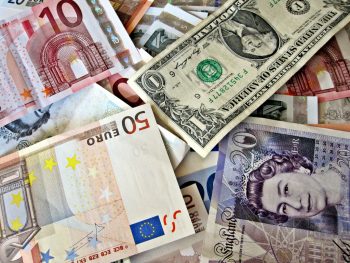The Dutch and All Their Money (Words) Posted by Karoly Molina on Dec 12, 2018 in Culture
There are so many stereotypes about the Dutch and money: cost savvy, always looking for a good bargain, and in a not so nice way, cheap. But are the Dutch really this thrifty and what does their language use say about the role money plays?
History
To understand why the Dutch tend to save and be less ostentatious than their counterparts, we need to look back into a bit of Dutch geschiedenis or history. Despite being ruled by Catholic Spain, the Protestant Reformation in the 16th century was very much felt in the Netherlands. Although Lutheranism didn’t become quite popular, other protestant waves such as the Anabaptism, found an audience in the lowlands. There are a few notable people from this time period including Dutch theologian, Desiderius Erasmus who emphasized middle-ground between the Catholic church and Lutheranism, and Menno Simons who later started the Mennonite church. The third wave of the Protestant Reformation, Calvinism, also made its way to the Netherlands and it is this wave that influenced the Dutch culture more than any other. To prevent Calvinism from spreading, the Spanish King began persecuting Calvinist rebels. In 1566, the Eighty Years War began to free the Calvinist Dutch from the Catholic Spaniards. Once the Netherlands gained its independence, it established itself as a Calvinist country and granted asylum to many people who were persecuted for their religion.
Calvinism
Although Calvinism is a complex ideology, it emphasizes three things: hard work, discipline, and frugality. The newly created country of the Netherlands (which at the time included Flanders) thus became a Calvinist country that tolerated those with different beliefs choosing to focus on their own work. People worked hard, they didn’t show off, they focused on getting things done. Have you walked around Amsterdam and were surprised you could easily look into people’s homes? This is said to be based on the Calvinist idea of having your house open because you have nothing to hide.
Vocabulary
Because the Dutch have learned for many generations to work hard and spend little, they are actually more prone to show off how cheap something is. There are so many words in everyday vocabulary that make reference to discounts and sales such as korting, voordeel, reductie, prijsverlaging, gratis (free), bespaar (save), and koopje (little purchase). Just watch any TV commercial from stores such as Albert Heijn, Plus, Kruidvat, and Lidl. Below is a commercial from Kruidvat, a store similar to Walgreens.
https://youtu.be/zwz1kh1C-KM
There are also some other expressions that don’t necessarily focus on frugality but are common to hear. Peperduur is one of my favorite. It makes reference to the times of the Dutch East India Company or the Verenigde Oost-Indische Compagnie. One of the most expensive spices at the time was pepper, so if something was very expensive, it was peperduur.
Another phrase is stinkende rijk or rijke stinkerds which have its English equivalent “stinking rich.” While I am no etymologist, I have heard this makes reference to the stink of the rich people at the church cemeteries. Back in the day, only very wealthy people were able to purchase a spot, and, because it was a family grave, it couldn’t be sealed, letting the stink out for everyone to enjoy.
The last phrase I want to cover is steenrijk which literally means stone rich. Baksteen or bricks used to be very expensive because a good percentage of each “batch” was not good enough to use. This meant only the very wealthy people could afford to have houses made out of brick. For many years and throughout Europe, a brick house became a symbol of wealth. There is a Dutch reality TV show called Steenrijk, Straatarm about a rich family trading places with a poor family. While the steenrijk in the show are not necessarily being very Calvinist, it is a great way to practice language!
https://youtu.be/ue42UxGcCzs
Are nowadays all Dutch people thrifty? No, of course not, and they probably weren’t all rich “back in the day” either. However, there is certainly a correlation between the Dutch and being money savvy and that is certainly a great trait to learn. I know I have!
How is money perceived in your country? Do you have any money related terms in your language?

Build vocabulary, practice pronunciation, and more with Transparent Language Online. Available anytime, anywhere, on any device.




